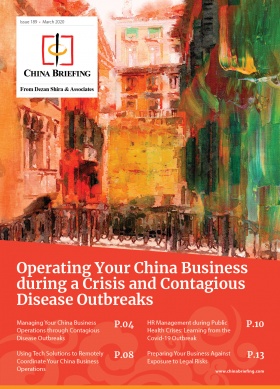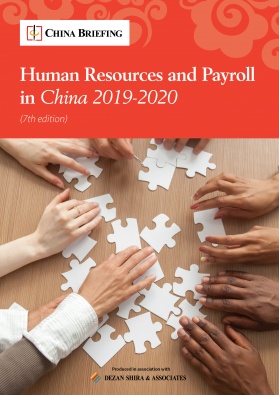Foreign Permanent Residency in China: New Draft Regulations Released
By Dorcas Wong and Fuki Fu
- China has released a new set of regulations to determine how foreign citizens can apply for permanent residency in China.
- The ‘exposure draft’ is open for public consultation till March 27, 2020 after which the regulations will get finalized.
- Key differences in the new regulations will cover levels of education and income as well as duration of work experience.
On February 27, 2020 the Ministry of Justice released the Regulations of the People’s Republic of China on the Management of Permanent Residence of Foreigners (Exposure Draft) (2020) to gather public opinions over the next month.
This exposure draft relaxes the standards for foreign citizens to apply for permanent residency in China – also known as China’s ‘green-card’ – which is notoriously hard to obtain, even for foreigners who have been in the country for many years.
While the new draft covers most of the provisions of the old regulations, it contains some key differences, most notably allowing those with high levels of education or wage income, combined with three to eight successive years of work experience in China to apply for foreign permanent residency.
According to Fuki Fu, Assistant Manager of Human Resources Administration and Payroll at Dezan Shira & Associates, “This draft introduces a new channel for which a foreigner can apply for foreigner permanent residency, one that is based on a threshold of one’s education, income, and work experience.”
“From this exposure draft and this broadened eligibility criteria, we see the intent of the Chinese government to attract more foreign talents through a long-term working period in China,” Fu explains. However, in many of the situations where the foreign permanent residency can be applied, a stringent criterion still applies.
The new regulations will be finalized following the conclusion of the public consultation period on March 27, 2020.
The regulations are set to replace the old Measures for the Administration of Examination and Approval of Aliens’ Permanent Residence in China (2004) (“the 2004 Regulations”) and will operate alongside the People’s Republic of China’s Exit and Entry Administration Law.
Who is eligible under the exposure draft?
The current exposure draft provides six categories of people that are eligible for permanent residency, the most relevant to businesses being:
Investment (Article 16)
A foreign citizen can apply for foreign permanent residency if they i) make investments in China according to the Foreign Investment Law (FIL); ii) have made steady investments in China for three years; iii) possess a sound tax and credit record; and iv) meet any of the following circumstances:
- They have made at least RMB 10 million (US$1.43 million) investments in China;
- They have made investments in areas encouraged by China, and the investment value, tax payment, and Chinese employees meet certain conditions*; or
- They have set up high-tech or innovation firms in China and are recommended by provincial-level governments.
This criterion largely mirrors that in the 2004 regulations – with the addition of a new circumstance that qualifies for residency: setting up high-tech or innovation firms.
* This is likely to be interpreted as similar to the Measures for the Administration of Examination and Approval of Aliens’ Permanent Residence in China (2004), which stipulates a lower investment threshold for investments in areas encouraged by China, Western China, Central China, or any key county under the National Poverty Relief.
Expertise, income, and study (Article 15)
Under Article 15 of the exposure draft is the newly added provision that stipulates that a foreign citizen may apply for permanent residency if they are working in China, have good tax and credit records, and fulfill one of the following situations:
- Having a doctorate degree or graduated from a well-known international university, and having worked in China for at least three successive years, during which the accumulated actual residence period is not less than one year;
- Working in one of the key industries or regions developed by the State for three successive years, during which the accumulated actual residence period is not less than one year, and the annual wage income is not less than four times the city average of the previous year;
- Having worked in China for successive four years, during which the accumulated actual residence period is not less than two years, and the annual wage income is not less than six times of the average city wage of the previous year, or;
- Having worked in China for eight successive years, during which his accumulated actual residence period is not less than four years, and the annual wage income is not less than three times of the city average in the previous year.
Urgently needed skills and talent (Article 13)
Article 13 of the draft consolidates the wording of Article 6 and 8 in the 2004 Regulations. This revised article points out that foreigners who need to be recommended due to the country’s economic and social development may apply for permanent residency if they fall into one of the following circumstances:
- Urgently needed talents introduced by the country’s key industries and regions and recommended by the competent authority;
- Academicians and researchers with titles of assistant professors and above who have been introduced and recommended by the state’s key universities and research institutions and professors and researchers who have been introduced and recommended by other universities and research institutions;
- High-tech enterprises, innovative enterprises, and senior management personnel and senior professional technicians introduced and recommended by domestic well-known enterprises; or
- Professionals recommended by foreigners who have obtained permanent residence status owing to their internationally recognized achievements.
This article replaces the previous ‘high level management personnel article’ in the 2004 Regulations – which contains a criterion that specifies job titles (for example, deputy general manager, deputy factory director, associate professor, or above) – and no longer specifies baseline period of residence in China.
Spouse, children, or elderly relatives (Article 17 and 18)
A foreign citizen’s spouse and children can apply for permanent residency at the same time, where any of the five eligible categories of the Draft are met.
Those who need a family reunion can apply for permanent residency if they fall into one of the following circumstances:
- The spouse is a Chinese citizen or a foreigner who resides permanently in China and has lived with the spouse in China for five years after marriage, and has accumulated actual residence of not less than nine months each year, with stable living security and residence;
- Children under the age of eighteen residing in China or with foreign parents permanently residing in China;
- Those who have reached the age of sixty, have no immediate relatives abroad, and depend on immediate relatives of Chinese nationality living in China or foreign relatives of permanent nationality who have permanently resided in China (must have stayed in China for five consecutive years, residing no less than 9 months every year, with stable living security and residence).
Other
Under the exposure draft, the following categories of people are also eligible for foreign permanent residency:
- Foreign citizens with internationally recognized achievements (Article 12)
Foreign citizens who have achieved internationally recognized outstanding achievements in the fields of economy, science and technology, education, culture, health, and sports can directly apply for permanent residency. Similar to Article 13 of the Draft, this category does not require a minimum residence period in China, nor does the article specify that the achievements are to have been made in China.
- Foreign citizens who need permanent residency for other legitimate reasons (Article 19)
Preparing for changes to come
Individuals and business can submit their feedback on the exposure draft with the Ministry of Justice before March 27, 2020.
Foreign investors should pay close attention to any revisions that are made during the consultation process, as to determine whether they are eligible for permanent residency status.
Once the regulations take effect, foreigners who fit the criteria for any of these above, can apply for permanent residency status at the Exit-Entry Administration Bureau of the public security organ of the place of residence.
Applicants should be prepared to report all relevant information to the bureau, along with submitting their passport, or international travel documents, identification information (such as interviews, fingerprint ID, photos) and all other application materials as required.
About Us
China Briefing is written and produced by Dezan Shira & Associates. The practice assists foreign investors into China and has done since 1992 through offices in Beijing, Tianjin, Dalian, Qingdao, Shanghai, Hangzhou, Ningbo, Suzhou, Guangzhou, Dongguan, Zhongshan, Shenzhen, and Hong Kong. Please contact the firm for assistance in China at china@dezshira.com.
We also maintain offices assisting foreign investors in Vietnam, Indonesia, Singapore, The Philippines, Malaysia, and Thailand in addition to our practices in India and Russia and our trade research facilities along the Belt & Road Initiative.
- Previous Article China Plus One Series: Indonesia’s Appeal to Foreign Investors in Asia
- Next Article COVID-19 Global Outbreaks: Coordinating Your Remote Business Operations






